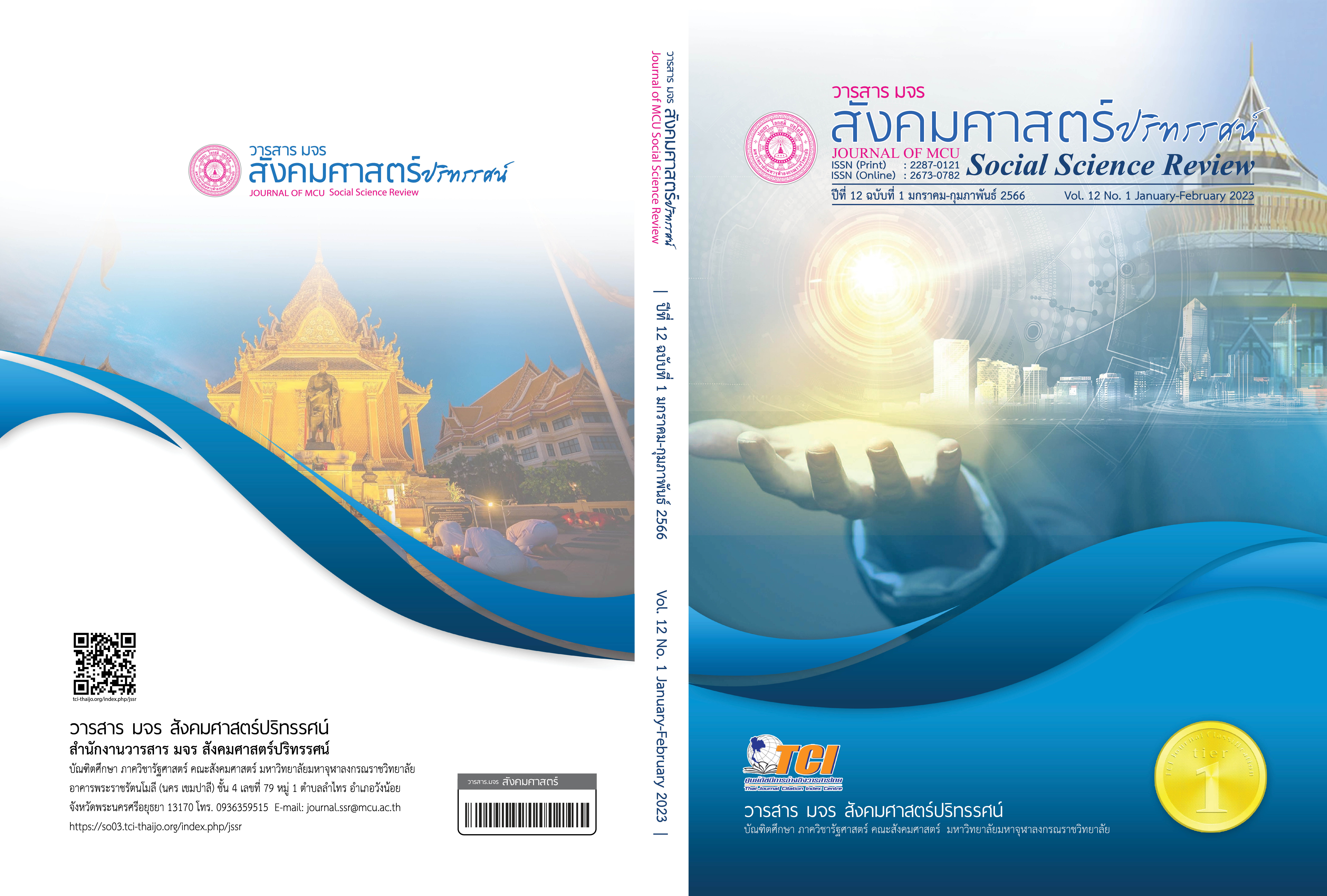“เที่ยวทิพย์แนวพุทธ” กับ “การเมืองปกติใหม่” ในยุคโควิด-19
คำสำคัญ:
เที่ยวทิพย์แนวพุทธ, การเมืองปกติใหม่, ยุคโควิด-19บทคัดย่อ
โรคโควิดทำให้ทั่วโลกเปลี่ยนวิถีชีวิตเป็นปกติใหม่เพื่อความอยู่รอด ทั้งรักษาอนามัย รูปแบบการเรียนการทำงาน ปฏิสัมพันธ์ต่อคนรอบข้าง ไม่ว่าเพศวัยสาขาอาชีพใดล้วนได้รับผลกระทบ ในยามจำเป็นต้องอยู่หรือทำงานที่บ้านเช่นนี้จึงเกิดกิจกรรมออนไลน์แก้เหงาที่เรียกว่า “เที่ยวทิพย์” โพสต์ภาพสถานที่เที่ยวสมมติว่าได้ไปจริง แต่พุทธศาสนิกชนสามารถใช้ปัญญาพลิกแพลงการเที่ยวทิพย์เป็นอุบายนำมาซึ่งบุญกุศลได้จริงตามที่พระพุทธเจ้าทรงรับรองอานิสงส์ไว้ ไม่ไร้สาระหรือเพียงสนุกสนาน และแม้โควิดทำให้มิอาจเดินทางตามปกติแต่ก็ไม่ได้ทำให้หมดโอกาสแสวงบุญ เพราะการแสวงบุญตามพระไตรปิฎกไม่ใช่การท่องเที่ยวศาสนสถานขอพรสิ่งศักดิ์สิทธิ์ตามความเข้าใจทั่วไป แต่หมายถึงความตระหนักและใฝ่ใจในบุญอันเป็นสิ่งสำคัญและพึงปรารถนา ซึ่งเกิดได้ทุกวิธีทุกที่ทุกเวลา ชาวพุทธจึงหาประโยชน์จากวิกฤตินี้ให้เป็นช่วงเวลาแสวงบุญได้ และสมควรยิ่ง ด้วยการน้อมหลักธรรมมาปรับใช้ให้สอดคล้องกับความลำบากที่ต้องเผชิญ เพราะได้ทั้งบุญและช่วยยึดเหนี่ยวจิตใจให้ผ่านทุกอย่างได้ด้วยดี นอกจากนี้ ชาวพุทธในฐานะพลเมืองของชาติก็สามารถพัฒนาตนด้วยธรรมะและการศึกษาเพื่อรู้เท่าทันบุคคลและสถานการณ์ และเพื่อเปลี่ยนสังคมการเมืองเป็น “การเมืองปกติใหม่”นำไปสู่การเมืองทิพย์หรือการเมืองอุดมคติให้เกิดขึ้นจริงในอนาคต
เอกสารอ้างอิง
คณาจารย์มหาวิทยาลัยมหาจุฬาลงกรณราชวิทยาลัย. (2559). มนุษย์กับสังคม ฉบับปรับปรุง(พิมพ์ครั้งที่ 3). พระนครศรีอยุธยา: สำนักพิมพ์มหาจุฬาลงกรณราชวิทยาลัย.
จักษ์ พันธ์ชูเพชร. (2557). รัฐศาสตร์ (พิมพ์ครั้งที่ 9). นนทบุรี: ธนภัทร.
ธีรพล อรุณกสิกร และคณะ. (2542). ระเบียบสำนักนายกรัฐมนตรีว่าด้วยการสร้างระบบบริหารจัดการกิจการบ้านเมืองและสังคมที่ดี. กรุงเทพฯ: สำนักพิมพ์วิญญูชน.
เปลื้อง ณ นคร. (2555). พจนานุกรมไทย-ไทย, สืบค้น 3 ธันวาคม 2564. จากhttps://dictionary.sanook.com/search/dict-th-th-pleang/มโน
พระธรรมโกศาจารย์ (ประยูร ธมฺมจิตฺโต). (2550), พระพุทธศาสนากับธรรมาภิบาล. พุทธจักร, 61(8), 5-6.
พระบาทสมเด็จพระปรมินทรมหาภูมิพลอดุลยเดช. (2512). พระบรมราโชวาทพระบาทสมเด็จพระปรมินทรมหาภูมิพลอดุลยเดช. สืบค้น 14 พฤษภาคม 2564, จากhttps://www.bedo.or.th/bedo/newcontent.php?id=74
มหามกุฏราชวิทยาลัย. (2561). พระไตรปิฎกและอรรถกถา แปล ฉบับมหามกุฎราชวิทยาลัย.นครปฐม:โรงพิมพ์มหาวิทยาลัยมหามกุฎราชวิทยาลัย.
ราชบัณฑิตยสถาน. (2546). พจนานุกรมฉบับราชบัณฑิตยสถาน พ.ศ. 2542. กรุงเทพฯ: นานมี. บุคส พับลิเคชั่นส
สมเด็จพระญาณสังวร สมเด็จพระสังราชสกลมหาสังฆปริยนายก. (ม.ป.ป.). บุญเป็นหลักใหญ่ในโลก. กรุงเทพฯ:ธรรมสภา.
______. (2550). วิธีสร้างบุญบารมี. กรุงเทพ: บริษัท พิมพ์สวย จำกัด.
สุรพล สุยะพรหม. (2558). ความคิดทางการเมือง:ประชาธิปไตย ตามแนวคิดของพระธรรมปิฎก (ป.อ.ปยุตฺโต). สืบค้น 14 พฤษภาคม 2564, จาก https://www.mcu.ac.th/article/detail/14340
ดาวน์โหลด
เผยแพร่แล้ว
รูปแบบการอ้างอิง
ฉบับ
ประเภทบทความ
สัญญาอนุญาต
ลิขสิทธิ์ (c) 2023 วารสาร มจร สังคมศาสตร์ปริทรรศน์

อนุญาตภายใต้เงื่อนไข Creative Commons Attribution-NonCommercial-NoDerivatives 4.0 International License.
เพื่อให้เป็นไปตามกฎหมายลิขสิทธิ์ ผู้นิพนธ์ทุกท่านต้องลงลายมือชื่อในแบบฟอร์มใบมอบลิขสิทธิ์บทความให้แก่วารสารฯ พร้อมกับบทความต้นฉบับที่ได้แก้ไขครั้งสุดท้าย นอกจากนี้ ผู้นิพนธ์ทุกท่านต้องยืนยันว่าบทความต้นฉบับที่ส่งมาตีพิมพ์นั้น ได้ส่งมาตีพิมพ์เฉพาะในวารสาร มจร สังคมศาสตร์ปริทรรศน์ เพียงแห่งเดียวเท่านั้น หากมีการใช้ภาพหรือตารางหรือเนื้อหาอื่นๆ ของผู้นิพนธ์อื่นที่ปรากฏในสิ่งตีพิมพ์อื่นมาแล้ว ผู้นิพนธ์ต้องขออนุญาตเจ้าของลิขสิทธิ์ก่อน พร้อมทั้งแสดงหนังสือที่ได้รับการยินยอมต่อบรรณาธิการ ก่อนที่บทความจะได้รับการตีพิมพ์ หากไม่เป็นไปตามข้อกำหนดเบื้องต้น ทางวารสารจะถอดบทความของท่านออกโดยไม่มีข้อยกเว้นใดๆ ทั้งสิ้น





